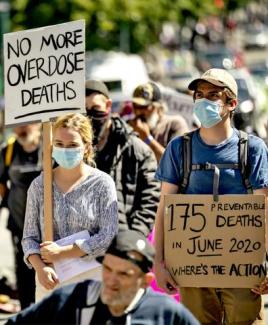COMPASSION IN ACTION
Drug users own ‘compassion club’ saves lives

IT’S ILLEGAL but Eris Nyx doesn’t care. She’s happy to break the law and risk ten-years in jail to take direct action with Vancouver drug users to help them stay alive.
Nyx and Jeremy Kalicum founded the Drug User Liberation Front (DULF) in August 2022. It is an ambitious, “compassion club”—a mutual aid program that sells 42 club members pure, tested drugs—and studies what happens next.
Storefront operation
DULF buys heroin, cocaine, and meth from the dark web and gets it tested to make sure it is safe. The tested drugs are sent back, measured, packaged, and sold to the club’s members at a fulfillment centre that operates like a regular storefront.
DULF applied to Health Canada for permission to purchase pharmaceutical-grade substances for supervised sales. Health Canada denied the request in July 2022.
Nyx and Kalicum decided to go ahead anyway.
“I’m only doing this because everyone else is too stupid and too fucking afraid,” says Nyx.
No DULF member has died from toxic drugs in the seven months since DULF started.
Mutual aid not new
Compassion clubs aren’t a new idea. The British Columbia Centre on Substance Use (CSU) wrote a whitepaper advocating for heroin compassion clubs back in February 2019.
(Dallas Buyers Club is a 2013 movie staring Matthew McConaughey as an AIDS patient who starts a compassion club in Texas in the mid-80s to distribute unapproved drugs to people with HIV/AIDS.)
Drug users have spearheaded needle exchanges, crack pipe giveaways, safe consumption sites, and overdose prevention sites, long before any of those things were legal or regulated.
“The thing that makes our [program] unique is that it’s demedicalized,” says Kalicum. “You don’t need a doctor, you don’t need a nurse.”
It’s been four years since the CSU paper and DULF remains the only heroin compassion club in B.C.—and it’s doing this work illegally.
Useful data
DULF has distributed over a kilogram of tested substances so far. But the point isn’t just to give out drugs to drug users at high risk of overdose: it’s to gather evidence on whether compassion clubs work, and how they could be better.
Although the DULF sample size is small, there’s solid qualitative data that’s gathered in interviews with the subjects.
“People aren’t really overdosing and needing to be revived… ,”says Kalicum. “People are telling us… that they’re using less drugs.”
Kalicum says other reported effects include members feeling “safer and protected from overdose,” that they are involved in less crime, have less police interaction, and have improved mental and physical health. But the compassion club isn’t a magical panacea.
“It doesn’t help with housing stability,” saus Kalicum. And “for some people, heroin’s not going to cut it, and they have to continue to use fentanyl and [be at risk of] overdose.”
Hope for approval
DULF is expecting to hear back from Health Canada by the end of summer. If the agency decides to reverse itself and approve the project and make it legal, DULF could buy drugs from pharmacies and eliminate the need for testing. It could scale up operations, and look into distributing other drugs or helping other communities set up similar compassion clubs, without the ever-present risk of criminal conviction.
- 30 -













Add new comment